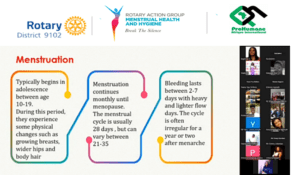… Calls for stakeholders to empower, support; end period poverty as well as pad a girl-child
The Rotary Action Group on Menstrual Health and Hygiene in collaboration with ProHumane Afrique International on May 28, 2023 organized an empowerment webinar to mark the 2023 Menstrual Hygiene Day. This celebration was observed under the theme: “a close look at the physical and mental health impact of menstruation on the Girl-child”.
The needs of the child girl are many, reason empowerment for her is a call in the right direction. To this end, Rotarian Dr. Naana Agyeman – Mensah an Assistant Governor of Rotary International District 9102 and member of the RAGMMH board called the virtual meeting organized through the zoom platform to order. This webinar had the likes of Dr. Edwina Appiah, the Municipal Health Director of Ablekuma West as well as Miss Winnifred Awurama Kyere- Yeboah, a Clinical Psychologist and Private Consultant provide very insightful education to participants on the theme for the day as speakers.
The speakers had these to say;
In most part of the world, menstruation is rarely talked about but “globally women form majority of our population. It’s estimated that 52% of the female population is in the reproductive age, but out of these women and girls – we anticipate that within 2 to 7 days every month should menstruate”. Though menstruation use to be part of the schools reproductive health week celebration, schools introduce the lower primary to the subject matter as well as provide them with pads for the first time. Which is usually the reusable type. Now we know the disposable pads, tampons and menstrual cups also exist. The main reason why they needed the pad and health impacts of menstruation were not talked about mostly. But advocacy on the subject is great now and we all now know that menstruation is not a taboo.
Menstruation begins during adolescence. Adolescence is the stage of life between childhood and adulthood, from ages 10 to 19. It is a unique stage of human development and an important time for laying the foundations of good health. Adolescents experience rapid physical, cognitive and psychosocial growth. Most girls get their first period when they’re around 12. But getting it any time between age 10 and 15 is OK. This day’s, times are changing and we observe some girls even menstruate earlier. Every girl’s body has its own schedule. During this period, they experience some physical changes such as growing breasts, wider hips as well as development of body hair. This natural process occurs monthly and must continue monthly until menopause. The menstrual cycle averagely lasts 28 days but can vary between 21-35 days. Bleeding lasts between 2-7 days with heavy and lighter flow. The cycle is often irregular for a year or two after menarche – which is one’s first menstruation. We observe that the first and second day’s flow are usually lighter, then it gets heavier and lighter towards the end depending on your days of flow.
Discussing the health impact of menstruation we realized that, ideally any girl or women of menstruation age is expected to see her menses every month. However, there are cases where the cycle becomes irregular for some month. For some the cycle can be observed to be 28days, then it changes to 21days then 35days and this makes some girls to begin to worry. These are seen during the earlier days between the first to second (1-2) years for the younger ones. Older women also experience these irregular conditions which could be due to other medical conditions.
During pregnancy and when we breastfeed frequently after child birth, we are not expected to see our menses for some months which is a very normal phenomenal. However, poor food intake aside pregnancy can also cause you not to frequently menstruate. So eat well. Eat your balanced diet with the right nutritional content the participants were admonished.
Aside amenorrhea, most females also experience menorrhagia which is excessive bleeding which causes anemia with low blood levels now happening to younger girls and not only older women as it used to be before. Participants were encouraged to take their diet seriously. Dysmenorrhea, painful flow that limits your ability to function normally giving some pains and gross discomfort were equally discussed. Some impact on health identified were anxiety, irritability, fatigue, breast tenderness, headache, acne, stomach upset, and loss of appetite, weight changes, backache, and cravings amongst other. And for most girls, the thoughts of approaching another menstruation gets them feeling nervous, depressed and stressed.

To manage our first period and subsequently, participants were admonished to talk to other girls and women or female friends with experience to provide support for them. If in school, talk to the school nurse and female teachers.
On how to empower the girl child, there was a clarion call to provide the girl –child all the essential information they need to help increase their confidence, knowledge and skills. We are expected to also provide them social support, materials and access to facilities and services which includes access to wash facilities, affordable and appropriate menstrual hygiene materials, information on good practices as well as an enabling environment.
The speakers noted, it is very important to be mindful always as young people of the physical and mental impact of menstruation. Same ways as stakeholders, it’s very important we understand the issues to enable provide support and solutions to the teenage minds. This they emphasized was because, we came from a generation before where menstruation issues were not part of our everyday conversation. But menstruation is not dirty and we need to discuss it at home, church, mosque and in school.
To break the silence and be humane; when it’s that time of the month, ladies – seek help to support you get answers to all your challenges. Participants were called to make pads available and accessible everywhere as well as end period poverty. This webinar was facilitated and sponsored by ProHumane Afrique International. A charitable development and think thank organization working with individuals and communities to provide sustainable solutions through diversified pro-poor initiatives. Participants for these all important webinar included Rotarians, Rotaractors, some members of the civil society organization platforms in Ghana, other international partners and guests.










